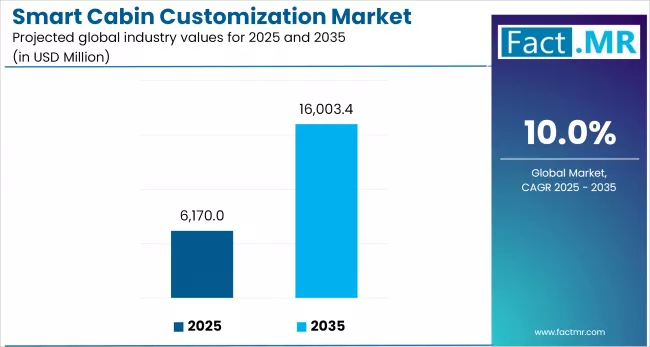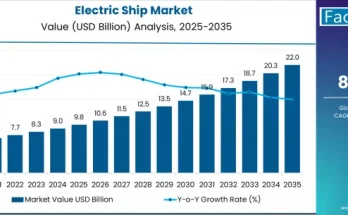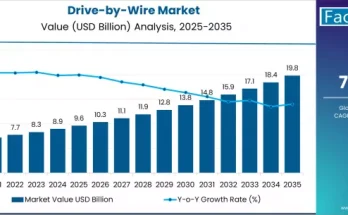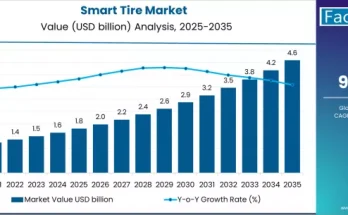As air travel continues to evolve, the concept of smart cabin customization is gaining momentum in the aviation industry. Airlines are increasingly focusing on delivering personalized experiences for passengers through technology-driven cabin solutions. Smart cabin customization integrates advanced infotainment systems, adaptive lighting, climate control, seating configurations, and connectivity tools, enabling airlines to enhance comfort, safety, and passenger satisfaction.
The growing emphasis on passenger experience, coupled with advancements in digital technologies, is shaping the smart cabin customization market. This trend reflects the aviation industry’s commitment to differentiating services while optimizing operational efficiency and resource utilization.
Market Overview:
Smart cabin customization encompasses a range of technologies and solutions that allow airlines to tailor the in-flight environment according to passenger preferences. From personalized lighting schemes and ergonomic seating to AI-driven entertainment and connectivity solutions, these technologies transform traditional cabin interiors into intelligent, adaptable spaces.
The market includes advanced hardware, software platforms, and integrated systems designed to improve passenger experience, streamline cabin operations, and enhance airline branding. Smart cabins also facilitate real-time monitoring of passenger comfort and operational conditions, enabling predictive maintenance and better resource allocation.
By combining IoT, AI, and cloud-based solutions, cabin customization allows airlines to offer unique experiences, whether for business travelers, families, or long-haul passengers seeking premium comfort. These advancements also support sustainability initiatives by enabling energy-efficient cabin operations and reducing waste through intelligent systems.
Regional Insights:
North America
North America is at the forefront of adopting smart cabin technologies due to the presence of leading airlines and aircraft manufacturers investing in next-generation cabin solutions. The region is witnessing rapid implementation of digital platforms, AI-driven customization, and immersive infotainment systems.
Europe
Europe continues to focus on passenger-centric innovations in aviation, with airlines integrating smart cabin features to comply with sustainability regulations and meet evolving traveler expectations. High adoption of AI and IoT in cabin operations is accelerating market growth.
Asia-Pacific
Asia-Pacific is emerging as a significant market due to increasing air traffic, expanding airline fleets, and growing consumer demand for enhanced in-flight experiences. Regional airlines are investing in modular cabin layouts, connected services, and personalized entertainment solutions to attract and retain passengers.
Key Trends & Forecast:
- Personalization of Passenger Experience
Airlines are increasingly deploying AI and machine learning to gather passenger data and offer tailored services. From adjusting cabin temperature and lighting to recommending meals or entertainment, personalization is becoming a core differentiator in the aviation sector. - Integration of IoT and Connected Systems
IoT-enabled devices in the cabin monitor conditions such as seat occupancy, air quality, and equipment performance. This data-driven approach ensures proactive maintenance, operational efficiency, and a seamless passenger experience. - Advanced Infotainment Solutions
Smart cabins are incorporating interactive entertainment systems, streaming services, and virtual reality experiences. These features enhance engagement and create a more enjoyable flight experience. - Energy Efficiency and Sustainability
Adaptive cabin systems optimize lighting, temperature, and power consumption, contributing to fuel savings and lower environmental impact. Airlines are leveraging smart cabin technologies to meet sustainability goals while maintaining passenger comfort. - Modular and Flexible Interiors
Modular cabin designs allow airlines to reconfigure seating arrangements, storage, and amenities quickly, depending on passenger demand or travel class. Flexibility in cabin layout enhances operational efficiency and maximizes revenue potential.
Applications & End-Use Outlook:
Commercial Airlines
Commercial carriers are adopting smart cabin technologies to improve passenger comfort, loyalty, and brand value. Intelligent seating, immersive entertainment, and customizable lighting are becoming standard features in premium cabins.
Business Jets and Private Aviation
Business jets are incorporating highly personalized cabin experiences, including automated lighting, climate control, and onboard connectivity, tailored to individual preferences. Private aviation operators use smart cabin customization to differentiate their services and enhance client satisfaction.
Long-Haul and Ultra-Long-Haul Flights
For long-duration flights, smart cabin customization addresses passenger fatigue, comfort, and overall well-being. AI-driven climate control, sleep-friendly lighting, and personalized entertainment ensure a more enjoyable travel experience.
Urban Air Mobility (UAM) and eVTOL Aircraft
As UAM and eVTOL platforms expand, the focus on passenger comfort and cabin ergonomics becomes critical. Smart cabin technologies are being adapted for shorter trips with seamless connectivity and adaptive layouts to meet emerging travel needs.
Technological Landscape:
AI and Machine Learning
AI algorithms analyze passenger behavior and preferences to adjust cabin conditions, recommend services, and optimize in-flight entertainment.
IoT and Sensor Networks
Connected sensors monitor seating, air quality, and lighting to ensure optimal comfort and support predictive maintenance, reducing operational downtime.
Cloud-Based Platforms
Cloud integration allows airlines to manage multiple aircraft fleets remotely, monitor passenger preferences, and deploy software updates efficiently.
Interactive Infotainment Systems
Touchscreen displays, streaming applications, and augmented reality experiences provide immersive and personalized entertainment options for passengers.
Cybersecurity Frameworks
As cabins become more digitally connected, robust cybersecurity measures ensure passenger data privacy and protection against potential threats.
Industry Outlook & Future Opportunities:
The future of the smart cabin customization market is defined by seamless personalization, intelligent automation, and advanced passenger-centric solutions. Airlines are expected to increasingly adopt modular cabin architectures, AI-driven services, and connected systems to differentiate their offerings.
Opportunities include:
- Development of fully autonomous cabin management systems
- AI-powered predictive passenger experience management
- Integration of wearable devices and mobile apps for real-time cabin control
- Expansion of energy-efficient and environmentally friendly cabin solutions
- Growth in ultra-luxury cabins for business and private aviation
As the aviation sector continues to evolve, smart cabin customization will remain a critical tool for airlines to enhance passenger experience, improve operational efficiency, and stay competitive in a rapidly changing market.
Conclusion:
The smart cabin customization market is transforming aviation by making air travel more personalized, comfortable, and efficient. By integrating digital technologies, AI, and connected systems, airlines can offer tailored passenger experiences while optimizing operations and sustainability. Embracing these innovations is essential for the next generation of aviation, where passenger satisfaction and technological excellence go hand in hand.
Browse Full Report – https://www.factmr.com/report/smart-cabin-customization-market



